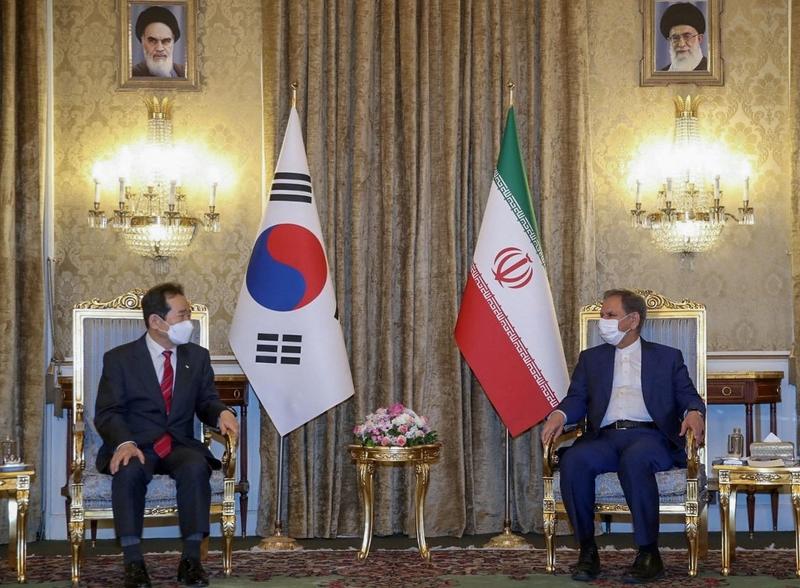 This April 11, 2021 photo shows Vice-President Eshaq Jahangiri, right, meeting with South Korea's Prime Minister Chung Sye-kyun in Tehran. (PHOTO / AFP)
This April 11, 2021 photo shows Vice-President Eshaq Jahangiri, right, meeting with South Korea's Prime Minister Chung Sye-kyun in Tehran. (PHOTO / AFP)
TEHERAN-Teheran has urged Seoul to release billions of dollars of Iranian funds frozen under US sanctions over its nuclear program during a visit by the South Korean premier to the Islamic republic.
Blocking Iran's foreign exchange assets in South Korean banks has marred the image of the country among the Iranian people, Iran's First Vice-President Eshaq Jahangiri said during a joint news conference on Sunday with South Korean Prime Minister Chung Sye-kyun in Teheran.
"We call on the (South) Korean government to release Iran's financial resources as soon as possible," he said.
The measures by South Korean banks, at the time when Iranians are in need of their resources to fight the coronavirus pandemic, have led to economic and health consequences, as the monetary resources could have been used to buy medical equipment, medicine and other essential goods for the country, Jahangiri said.
Chung's visit came after Iran on Friday released a South Korean-flagged tanker it had seized three months ago as Teheran pressed Seoul to unblock the billions in frozen oil funds.
For his part, Chung said the two countries have agreed to work on ways to expand mutual relations, and South Korea will increase humanitarian aid, including medicines and medical equipment, to Iran.
The measures by South Korean banks, at the time when Iranians are in need of their resources to fight the coronavirus pandemic, have led to economic and health consequences, as the monetary resources could have been used to buy medical equipment, medicine and other essential goods for the country, Iran's First Vice-President Eshaq Jahangiri said
ALSO READ: US to challenge World Court's jurisdiction in Iran sanctions case
Iran had accused South Korea of holding "hostage" $7 billion of its funds, but Teheran has repeatedly denied the seizure of the vessel was linked to the issue.
Iran was a key oil supplier to resource-poor South Korea until Seoul stopped its purchases after a US decision in 2018, under then-US president Donald Trump, to unilaterally exit the Iran nuclear deal and reimpose crushing sanctions.
New US President Joe Biden has signaled his readiness to revive the accord. Iran and world powers held what they described as "constructive" talks last week aimed at reviving the 2015 nuclear deal with Teheran that Washington abandoned three years ago.
Sabotage act
In another development, Iran blames regional arch-foe Israel for Sunday's sabotage act at the Natanz nuclear site and will take its revenge, state TV quoted Foreign Minister Mohammad Javad Zarif as saying on Monday.
Iranian authorities described the incident a day earlier as an act of "nuclear terrorism" and said Teheran reserves the right to take action against the perpetrators.
"The Zionists want to take revenge because of our progress in the way to lift sanctions ... they have publicly said that they will not allow this. But we will take our revenge from the Zionists," Zarif was quoted as saying.
Multiple Israeli media outlets have quoted unnamed intelligence sources as saying the country's Mossad spy service carried out a successful sabotage operation at the Natanz site, potentially setting back enrichment work there by months. Israel has not commented on the incident.
READ MORE: Iran says crew of detained South Korean vessel can leave
The Natanz uranium-enrichment site, much of which is underground, is one of several Iranian facilities monitored by inspectors of the International Atomic Energy Agency, the UN nuclear watchdog.
Iranian Foreign Ministry spokesman Saeed Khatibzadeh said on Monday the Natanz incident could be considered as an "act against humanity", adding it had caused "no contamination or casualties" at the site.
"Our nuclear experts are assessing the damage but I can assure you that Iran will replace damaged uranium enrichment centrifuges in Natanz with advanced ones," Khatibzadeh said.
A senior US official said Washington had no involvement in the incident. "We have nothing to add to speculation about the causes," the official said.


